Crashing Kim's Reality Show
Armed with a German passport and pictures of a pretend family, this reporter crashes the world's weirdest film festival, and an entire country that seems like a set for some strange science fiction flick. Sadly, the cast is kitted out with real people who have never seen the paradise in North Korea.
By Ron Gluckman /in Pyongyang and around North Korea
IF THE APOCALYPSE WAS UNDERWAY, Then I had a ringside seat. Perhaps the best view in all of North Korea, in fact.
My room in the sleek Yanggakdo Hotel overlooked Taedong River, running through central Pyongyang, cornerstone of the infamous Axis of Evil.
From my windows, I could follow the river’s flow past the Tower of the Juche Idea, a 170-meter-tall obelisk (tipping the Washington Monument by a meter, according to boastful local travel brochures), named for the bellicose regime’s failed philosophy of self-reliance, clear to rows of ashen but idle smokestacks far downstream.

At night, the flaming torch atop this arresting white-granite tower blazed blood-red over Pyongyang’s surreal skyline. At least until 10 p.m., when everything in this Potemkin town – torch, buildings, street lights – went dead black to conserve power.
From my hotel windows, I took it all in: Up and down the shores stood a wacky array of absurd architecture, from the simply strange (enormous ice rink cradled inside upside-down art-deco ice cream cone) to the ridiculous-of-stratospheric proportions, like the Ryugyong Hotel.
 Soaring 105 stories, this spaceship-style hotel would be the world’s
tallest… if ever completed. Lacking elevator shafts, the decades-old abandoned
shell instead ranks as the biggest fabrication.
Soaring 105 stories, this spaceship-style hotel would be the world’s
tallest… if ever completed. Lacking elevator shafts, the decades-old abandoned
shell instead ranks as the biggest fabrication.
But with ample competition, lining the Taedong River shores, a slew of inane showpiece structures meant to imply grandeur. Clunky in cheesy Cold War communist style, and cheaply executed, they only emphasized that this, clearly, was not only the planet’s poorest, most pitiful world power, but also the runaway leader in bad taste.
Still, no other nation the size of Mississippi is so often in the news, or considered a fraction as threatening. Hardly hours had passed since I slipped into North Korea, where few outsiders get a first-hand look, only to find the pariah state again at the flash-point of controversy.
An explosion had rocked the remote border with China. As a vast mushroom cloud billowed above Yanggang Province, observers around the globe nervously fretted that this might be the long-feared test blast, signaling North Korea’s explosive - and most unwelcome - entry into the small community of nuclear nations.
Not that you would have caught a twitter here, where state news is unfalteringly formulaic, airing blustering tirades against "aggressive US imperialists" and "their South Korean puppet stooges."
Or flowery features about soaring steel production and locally-hosted summits, designed to convey a sense of importance to a population that, in reality, was bankrupt and starving. All the while, real news was constantly recast by state propagandists or suppressed altogether.
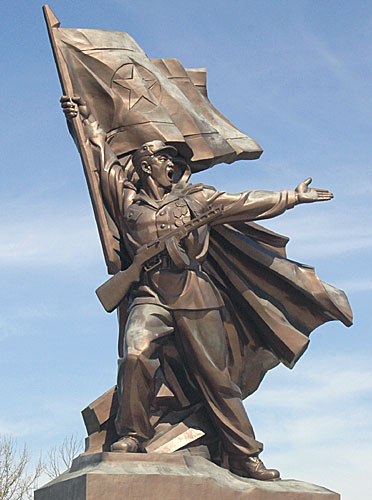 Hence, North Koreans had no absolutely no idea about the nuclear brouhaha
brewing on their own border. But, from my hotel, I took it all in. That’s
because, unlike North Koreans, I could watch the BBC.
Hence, North Koreans had no absolutely no idea about the nuclear brouhaha
brewing on their own border. But, from my hotel, I took it all in. That’s
because, unlike North Koreans, I could watch the BBC.
In one of a series of odd coincidences, British Foreign Office Minister Bill Rammell was visiting North Korea at the time, with a BBC crew. Hence, the blast not only triggered global jitters, but was reported inside the Hermit Kingdom, rare breaking news made all the more bizarre by the sinister, speculative repartee between London and local crew.
Draconian restrictions meant they could go nowhere near the blast site, nor get any information from officials. That left them as clueless as locals always are about world affairs. Except my guides, who received daily BBC updates from me.
That I was keeping a pair of North Koreans abreast of dramatic, possibly catastrophic events in their own country, by way of broadcasts banned outside foreigner-only hotels (which have North Korea’s only remote controls; locals need none, since there is only one channel, spewing nonstop state drivel), with news that emanated from inside this insanely insular nation, might sound preposterous, but proved par for the course on what had to be the weirdest trip I’ve ever taken. At least since my previous visit.
 Understand, Americans like me are most unwelcome here. Reporters less so. Yet,
13 years prior to my visit two Septembers ago, I
had slipped through the Kimchi Curtain, posing as an English teacher from
China.
Understand, Americans like me are most unwelcome here. Reporters less so. Yet,
13 years prior to my visit two Septembers ago, I
had slipped through the Kimchi Curtain, posing as an English teacher from
China.
This time, I was masquerading as a German film buff from Hong Kong, intent upon crashing the Pyongyang International Film Festival. Held every two years in the fall, it seemed an opportune time to mingle with visiting dignitaries, diplomats, culture-starved North Korean aid workers, plus whatever passed for Pyongyang’s coffee-house crowd.
Lacking an invite, I’d devised a bogus identity as a distributor of art films to Asian coffee houses, complete with fake resume (and touring North Korea, carrying on this unscrupulous exercise, I carried family pictures – but of a friend’s kids! And, shamefully, I showed them off, my stand-in family, as in this picture below).
 Amazingly, Pyongyang bought the entire charade. Among the litany of jokes about
Intelligence Agencies, here’s another: if North Koreans had access
to the internet (they don't) they would hardly need to Google my name.
Amazingly, Pyongyang bought the entire charade. Among the litany of jokes about
Intelligence Agencies, here’s another: if North Koreans had access
to the internet (they don't) they would hardly need to Google my name.
Less than a dozen keystrokes would take them to gluckman.com, and my reports about this pariah state, dating back to my first visit in 1991.
Anyway, screening unwelcome guests, shouldn’t take too much time in this police state. Fewer than a thousand tourists come each year from outside the old socialist sphere.
The arrival board at Pyongyang’s dowdy international airport underscored the scarcity of visitors when I landed. North Korea is linked to the outside world by a mere three flights weekly, all to China. Which most likely explained the staid fashion look.
Guide Kim Sung Dok awaited in the airport reception room, in tinted Chinese glasses and polyester slacks. He was accompanied by a second guide, or minder, Sok Yong He, a woman who daily alternated amongst utterly-outdated Jackie Kennedy-style getups, vivid orange, pink or canary-yellow go-go skirts in matching pumps and pill-box hats.
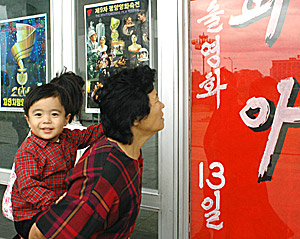 The entire ride to the hotel, I pestered the pair about festival tickets.
The entire ride to the hotel, I pestered the pair about festival tickets.
While I checked in, Mr Kim fetched a program. Then we regrouped in the lobby to see what screenings fit my itinerary. I was happy to ditch visits to fish farms in favor of art films from Poland and the Ukraine.
"You have to understand, I’m a huge film fan," I was telling Kim, when a woman at another table suddenly stood and approached.
"Excuse me," she said, offering her hand. "I don’t mean to be rude, but I cannot help overhearing your discussion. Please come join the other Germans here for the festival at a party in my house."
Her card identified her as Doris Hertrampf, German ambassador to Pyongyang. Only thirty minutes in North Korea, and I was busted.
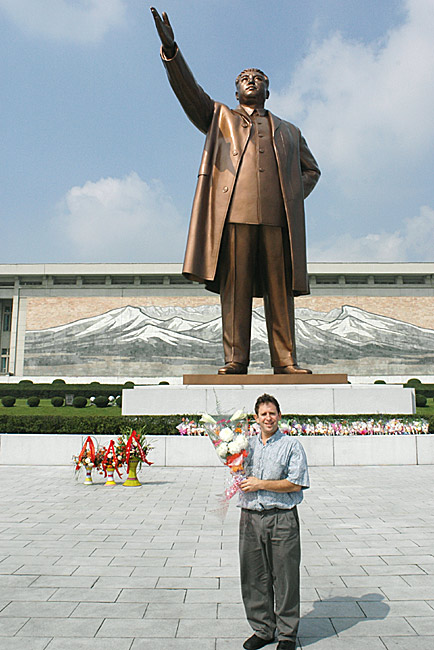 Realize, despite brand new burgundy Bundesrepublik Deutschland passport, ich
spreche not a lick of Deutsche.
Realize, despite brand new burgundy Bundesrepublik Deutschland passport, ich
spreche not a lick of Deutsche.
The only German thing about me, in fact, is my dad, a Berlin-born Jew made stateless as a boy by the Nazi regime. Most of his family perished in the Holocaust, a tragic event that I – in callow journalistic style - was willing to exploit as my ticket back to the world’s latest Axis.
It was a desperation shot-in-the-dark, but the guilt-ridden Germans generously proffered a passport. I was brazenly candid about my aim, at least to them. When an embassy official in Beijing, where I was based at the time, asked why I desired citizenship, I bluntly replied: "To go to North Korea."
Months later, after frantic applications to booking agents around the globe, mission accomplished, however insane it seemed, this supposed German film fanatic with English-speaking guide and glaring ignorance of cinematography. Could anything be more ludicrous, I thought, perusing the program, as Kim went for tickets?
In this People’s Paradise, though, silliness always had a way of stepping up a notch or two. Kim returned with passes not only to the gala opening, but also the featured film, the premier of "Bend it Like Beckham."
While this might seem insignificant years after it played the rest of the world, you have to realize it was the premier, as in not just at the festival, but the first Hollywood picture ever to show anywhere in North Korea.
Not that North Koreans shun cinemas. They visit 15-20 times a year, nearly 10 times the average in South Korea. Of course, southerners have DVDs, cable and the internet, all banned by the dictator-director-in-chief. Long before his star role as magnificently-coifed villain in "Team America," North Korean ruler Kim Jong Il ran the state studio, modestly taking the title, Genius of the Cinema.
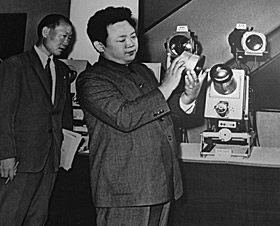 Genius claims a library of 15,000 titles, and a well-reported fondness for James
Bond and Elizabeth Taylor (representatives from cable networks in Beijing have
told me how, as a condition of visiting North Korea, they agreed to install and
maintain porno for the Dear Letch).
Genius claims a library of 15,000 titles, and a well-reported fondness for James
Bond and Elizabeth Taylor (representatives from cable networks in Beijing have
told me how, as a condition of visiting North Korea, they agreed to install and
maintain porno for the Dear Letch).
Yet local denizens are limited to P-rated flicks, Party-approved schlock like "Sea of Blood," "The Fate of the Self-Defense Corps Man" and "The First Party Commissioner." Attendance is often compulsory.
These and other propaganda flicks are churned out of a studio at Hongzesan, a Pyongyang suburb, where a guide told me Genius has visited 592 times. Sets at the studio can be altered to provide backdrops for ancient odysseys, World War II-era shoot-em-ups or modern pictures.
But the script of 1,000 films issued since 1946 varies only in the choice of Bad Guy, as North Koreans struggle for national unity against a stream of villains: Japanese colonists, decadent American imperialists or their puppets, the South Koreans.
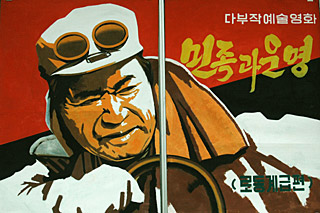 Nothing changed radically with the launch of the Pyongyang Film
Festival of the Non-aligned and Other Developing Countries in 1987. Initially it
specialized in flicks from the fringes of the silver screen, tales of
revolutionary struggles from the communist world, Middle Eastern guerrilla
groups and African oppression.
Nothing changed radically with the launch of the Pyongyang Film
Festival of the Non-aligned and Other Developing Countries in 1987. Initially it
specialized in flicks from the fringes of the silver screen, tales of
revolutionary struggles from the communist world, Middle Eastern guerrilla
groups and African oppression.
The first gold went to "The Shrapnel," an uniquely Libyan love story: boy meets girl, girl is killed by imperialist land mines, in rushing to her aid, boy is also killed in explosion. The top prize in 1996 went to "Red Cherry," described in programs as a "Chinese tribute to the Chinese and Russian triumph over German fascism in World War II."
Modernization in recent years brought films from Hong Kong, India,
Korea, Europe, and a regular staging every two years. A record hundred films
from 40 nations were represented at the last festival in September 2004, which
opened with "The Mafia," an Egyptian mob movie starring a Stallone-look
alike and lots of exploding cars.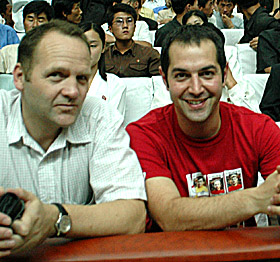
Most of the program featured less fetching, politically-correct films. The family sketch, "Mother and Daughter," from China, claimed the gold, while the next two prizes went to movies from Iran and Syria. Clearly, this was a long stretch from Cannes.
"No deals get done in Pyongyang," Daniel Gordon, British maker of a pair of North Korean documentaries and keynote speaker in Pyongyang, told me before the opening curtain rose. "This festival has absolutely no glitz, no glamour. In fact, no one else goes," he said, adding gleefully: "That’s practically reason enough to go."
Actually, as I soon found, the titillation of the Pyongyang film festival came off screen, in the surreal, other-worldly setting of the ultimate Reality Show, where everything was contrived, all buildings seemed facades and the people actors in a nationwide farce.
Take the Grand People’s Study House, the national library. The stock includes 1,500 books written by the Great Leader during university days that, at over a book a day, clearly were prolific.
The collection, I was told, is both comprehensive and uncensored. "Anyone can browse the great books of the world," boasted the librarian. But when I requested English literature, a long wait at the rails produced only two worn computer manuals from a decade ago.
Set atop Nam Hill, the library enjoys 360-degree views of Pyongyangg. Slipping onto the roof, I saw a sparkling capital shining in the sun after several days of rain. Below were the massive ministries around Kim Il Sung Square.
From the sprawling square, my eye wandered across the Taedong River to vast plazas encircling Juche Tower. The view was glorious, but oddly unsettling. All of a sudden, with a jolt, I realized why. No boats were on the water, no sunbathers on the shores. Streets, promenade, plazas; all were eerily empty.
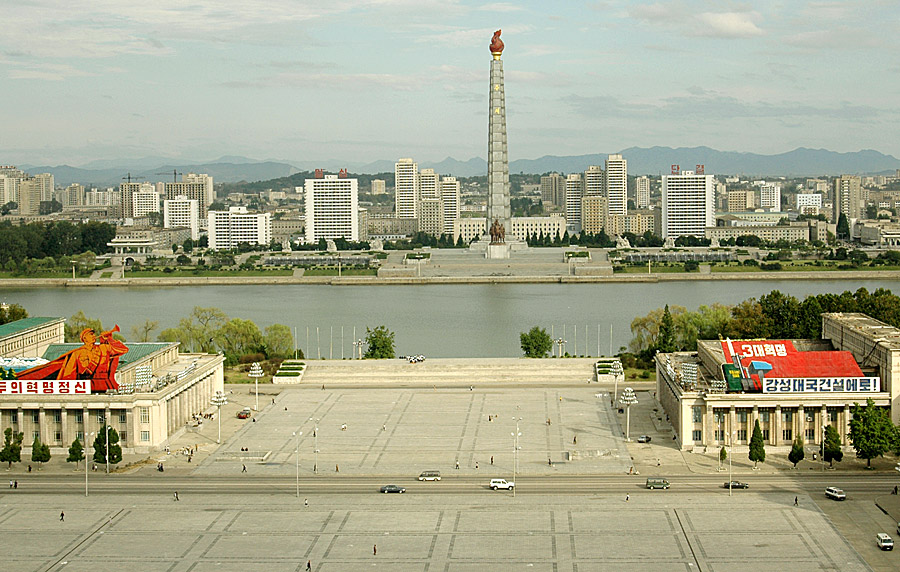
It was like a still life, sky and buildings all perfectly rendered, but nobody had bothered to brush in buses or cars or people.
Another day, after visiting several military museums (where America was denounced as a vile world bully and bastion of capitalistic greed, but US greenbacks were gladly accepted at adjoining gift shops), Kim guided me to the Arch of Triumph.
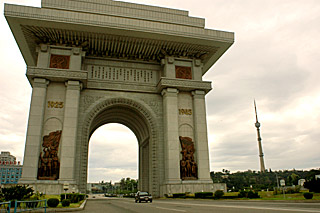 Not the Paris version, but Pyongyang’s own, bigger, better arch. With a North
Korean innovation: emptiness. For several minutes, I waited with camera before a
single car rolled down the broad but vacant boulevard under the forlorn gateway.
Not the Paris version, but Pyongyang’s own, bigger, better arch. With a North
Korean innovation: emptiness. For several minutes, I waited with camera before a
single car rolled down the broad but vacant boulevard under the forlorn gateway.
North Korea doesn’t have your usual tourist attractions or adventure options. "It’s a bit like your usual holiday with sex, sun and sand," advised Nicholas Bonner, back in Beijing, before my departure.
"Except there’s no sun, no sand, and certainly no sex!" he joked. "I mean, where else can you go on holiday and visit a cement plant?"
Bonner once qualified as the travel world’s biggest joke. A trip taken as a lark to North Korea a dozen years ago evolved into an evocation for this English landscape architect and artist. His Beijing-based Koryo Tours has become the largest booking agent for westerners, bringing over 300 to North Korea each year.
"North Korea is definitely out there," he said, "but out there is where a lot of people these days want to go."
Indeed, the Democratic People’s Republic of Korea is monumental folly, but that’s the allure. If travel is fueled by a desire to experience something unique, North Korea may be the ultimate destination, a huge Socialist Disneyland more remote in many ways than Everest or the Sahara.
Where else can one go nowadays without spying a Starbucks or Internet café? Nor will you be disturbed by mobile phones, as I inadvertently found after landing at the airport, where mine was promptly confiscated.
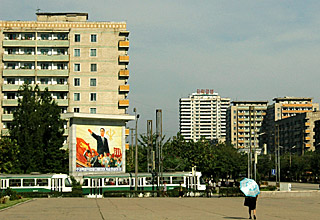 My tour didn’t stop at cement plants, but it did take in the International
Friendship Exhibition, wacky even by way-out North Korean standards. A colossal
gift museum, hundreds of tribute-filled rooms were meant to attest to the
Greatness and Dearness of the Kims.
My tour didn’t stop at cement plants, but it did take in the International
Friendship Exhibition, wacky even by way-out North Korean standards. A colossal
gift museum, hundreds of tribute-filled rooms were meant to attest to the
Greatness and Dearness of the Kims.
But the booty, much of it from fellow despots, was hilariously tacky: cheap Chinese radios, plastic boats and, my favorite, a stuffed crocodile, mounted upright with toothy grin, carrying a cocktail tray, from those goofy Sandinistas of Nicaragua.
Of more genuine interest was a tour of the Demilitarized Zone (DMZ), the razor-wire topped corridor spanning the Korean Peninsula that remains, since the fall of the Berlin Wall, the final flash-point from the Cold War.
Sliding pointer across a map so primitive it would elicit howls at any grade school, Colonel Kim Kwang Gil detailed the origins of the Korean War (Surprise; it was an American sneak attack!). Then, I posed with scrawny North Korean soldiers in a setting that people on both sides of the DMZ dream about – an undivided Korea.
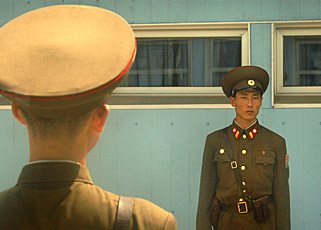 The truce room, straddling the border, has hosted peace talks leading nowhere
for half a century. Last time I visited, a huge line crossed the room, and the
table for the talks. Outside, enormous loudspeakers on both sides blared
propaganda, while the Koreas childishly competed by erecting flag poles ever
larger.
The truce room, straddling the border, has hosted peace talks leading nowhere
for half a century. Last time I visited, a huge line crossed the room, and the
table for the talks. Outside, enormous loudspeakers on both sides blared
propaganda, while the Koreas childishly competed by erecting flag poles ever
larger.
As part of efforts to diffuse the terse atmosphere at this last flash-point in the Cold War, the flagpoles and speakers have been dismantled. And the line is gone.
Peace talks still fail to resolve the world’s longest running war, but the room comprises an united Korea, albeit only a few square meters; it’s the only part of the peninsula where you can freely cross from side to side.
These are the standard sights a trickle of North Korean tourists have seen for years. Yet, more areas have opened up as a starving nation turns to tourism for hard cash.
Excursions range to Paekdusan, tallest peak on the peninsula, and Kumgangsan (Diamond Mountains), believed to be the cradle of Korean civilization. Pyongyang, having honed its poker skills in never-ending Six Party Nuclear Talks, saddled South Korea’s Hyundai with a nearly billion dollar pledge to develop Kumgangsan tourism, then restricted visits to South Koreans, and only via a small path up the mountain, to keep them from polluting northerners with capitalistic vices.
Sadly, similar segregation applies to all outsiders, who are kept in tourist-only hotels, taking meals in foreigner-only restaurants (on the plus side, they do have food).
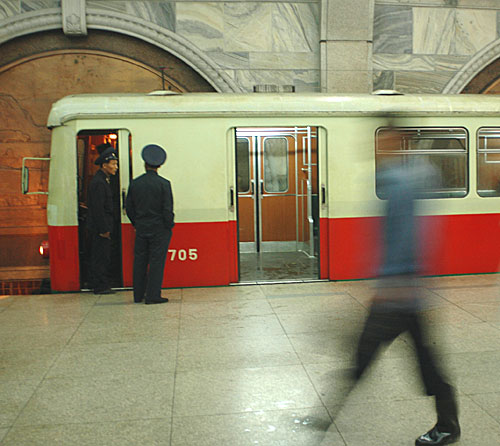 A quirk of booking spared me embarrassing breakfast
conversations over five-minute eggs. Instead of explaining my lack of language
at the German table, I miraculously wound up alone, daily facing bowls of
congee, the Hong Kong delicacy.
A quirk of booking spared me embarrassing breakfast
conversations over five-minute eggs. Instead of explaining my lack of language
at the German table, I miraculously wound up alone, daily facing bowls of
congee, the Hong Kong delicacy.
The Yanggakdo Hotel sat upon the delightfully-named Yanggakdo (Island of Goat’s Head), smack in the middle of the Taedong River. The hotel sported stunning views of Pyongyang, we just couldn’t wander there on our own.
Walk out the door, and you would be met by minders who would trail along; if you successfully chided them away, others would follow. Just good manners of hosts in North Korea, they insisted.
And why, they wondered, would anyone want to leave a hotel containing everything you wanted in North Korea: coffee shop and convenience store in the lobby; karoake and massage upstairs; tucked in the basement, a beauty salon, bowling alley and casino with Egyptian-theme and American-made Nevada slots.
Surrounding the spiffy hotel was a small golf green. (Bonner brings duffers here and to the country’s only proper course on a tour dubbed, "The Last Hole on Earth.")
Seeing North Korea itself proved much more challenging. My visit to the forlorn beach town of Wonsan included a stop at a youth camp, its children made to assemble in the rainy square and goose step for my tour group – my two guides, driver and me.
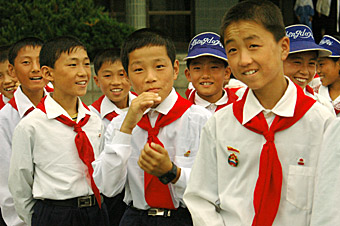 After a long drive back to Pyongyang, I was taken to a
showpiece school, where smartly-dressed kids demonstrated music and martial arts
talent. Yet, my pleas to stop at simple schools we passed along the way were
summarily refused.
After a long drive back to Pyongyang, I was taken to a
showpiece school, where smartly-dressed kids demonstrated music and martial arts
talent. Yet, my pleas to stop at simple schools we passed along the way were
summarily refused.
Still, there were intriguing excursions, many novel. I visited Ryonggan Hot Springs, which, until mid-2004, was off limits to all but state VIPs. Hardly luxurious, it looked low-rate Las Vegas, orange tiles on the wall, threadbare floral carpet and an enormous Jacuzzi tub.
But early mornings, I could walk down the driveway to hear loudspeakers blare uplifting slogans: "Resist imperialist temptation!", "Struggle to uphold the revolution!" and "Victory is assured!"
Similar messages could be spotted on the roofs of model villages along rural roads, marking North Korea as a place lost in time, circa the Cultural Revolution. Which is a lure to the main tourist traffic these days, Chinese groups. They come in nostalgic fervor for Mao and find, in terms of personality cult, Kim out-does the Chairman.
The Great Leader’s mug beams from signboards at every intersection, while massive statues tower over listless city centers. Especially impressive – absurdly so – was the 20-meter-tall Kim colossus in Pyongyang, apparently too tacky even for some comrades.
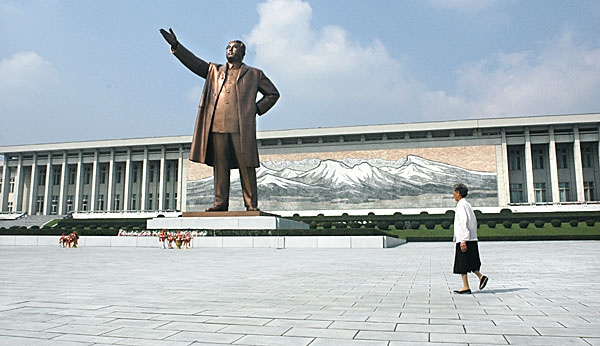
Deng Xiaoping, visiting some years ago, reportedly was miffed to see it covered in gold leaf, amidst constant Chinese bailouts. The gilding was scraped off, perhaps the sole concession to restraint in this over-the-top Socialist Disneyland.
"Everything here is like China, just long ago, like in my parent’s time," marveled one Beijing visitor, Li Zhen Hua, 30. "But it’s familiar to me, too. I just turn on the TV back home and hear the same stuff. But, the weird thing is this isn’t a movie, it’s a real country, with real people and they think and talk that way. It’s really strange."
Strange hardly does justice to this huge Theater of the Absurd. Trips to the countryside provided the best insight, not that my minders let me stray far from the script.
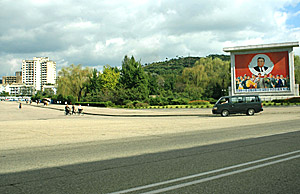 One trip was to a fish farm (it could have been worse; some tourists have
been taken to the Great Leader’s personal pomegranate tree), an unavoidable
pit-stop on the way to one of North Korea’s largest waterfalls, at Ullim.
One trip was to a fish farm (it could have been worse; some tourists have
been taken to the Great Leader’s personal pomegranate tree), an unavoidable
pit-stop on the way to one of North Korea’s largest waterfalls, at Ullim.
For three hours, we drove deserted roads, past lines of pitifully shabby people carrying sacks or pushing wood carts along the shoulder. I saw fewer than a handful of vehicles on the road, and in the fields, no tractors of any kind, and hardly any livestock.
Yet, at the waterfall, a group of North Koreans in spiffy sports clothes magically materialized. And didn’t mind me taking their pictures, unlike locals who complained to my guides when I risked candid shots. It was picture perfect, until I recalled the bus in the parking lot as we pulled in, filled with the only passengers seen the entire day.
Did they bus in extras just for my waterfall shoot? "Don’t flatter yourself," filmmaker Gordon, who has visited North Korea dozens of times, retorted back in the hotel. "They wouldn’t go to all that trouble. You’re not worth it."
Still, I couldn’t help wondering. Another day, tooling around Pyongyang, I asked Kim about the Whisper automobile, featured on billboards that were the sole advertising to be found in the entire country (some reports call it "the Whistle.")
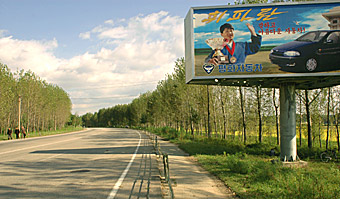 Sent in kit form from South Korea, of Fiat parts, the
car was supposed to get commerce rolling in the north. Kim said it was selling
well, but couldn’t point out a single one. Every few hours, I reminded him.
"Any Whispers along this road?"
Sent in kit form from South Korea, of Fiat parts, the
car was supposed to get commerce rolling in the north. Kim said it was selling
well, but couldn’t point out a single one. Every few hours, I reminded him.
"Any Whispers along this road?"
Still later: "Mr. Kim, what happened to all those North Korean cars?" He stayed silent; not a whisper that day. The next morning, practically the minute we set out, he gestured ahead. "Look, there’s a Whisper." It was the only one I saw in eight days. Except on billboards, over uniformly empty streets.
Surprisingly, despite such deceit, I felt marginally upbeat on my repeat visit to North Korea. There were positive signs of change, however subtle.
On the route to the DMZ, for instance, Kim pointed out convoys of trucks carrying rice from South Korea. Then we discussed the years of famine that have killed thousands here. No such admission of crop failure or weakness would have dared been discussed before.
There were also signs of reform, some, like shabby shops around the capital, so obtuse that only a repeat visitor might note the improvements. During my last visit, I spotted padlocked grocery stores on the main streets, single stacks of fruit pushed by plywood sheets against the front windows to give the appearance of stock to tourists driven past.
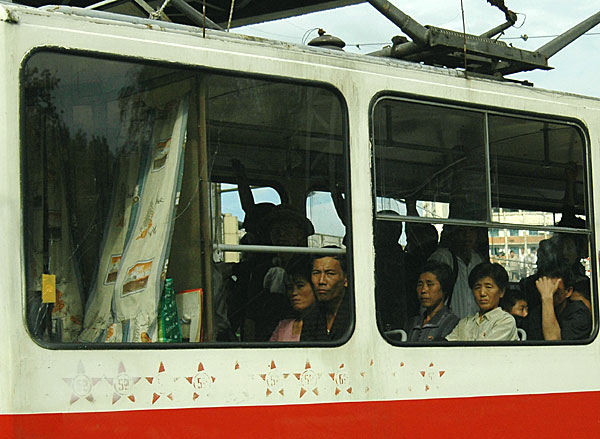 Moreover, the population had evolved, splashes of color replacing the drab
gray dress of before. Kim was disappointed to discover the Elvis on my Ipod was
not Presley, but was soon crooning to Crowded House and Coldplay.
Moreover, the population had evolved, splashes of color replacing the drab
gray dress of before. Kim was disappointed to discover the Elvis on my Ipod was
not Presley, but was soon crooning to Crowded House and Coldplay.
Sok, put a socialist spin on Jackie O, with her shockingly bright suits. She was also keen to suggest a worldly manner, asking me about rock groups and pestering me for information about Michael Jackson’s sex-change operation.
When I asked the name of her favorite band, she paused and, perhaps remembering my adopted nationality, replied: "Edelweiss."
Yet, for all the stumbling, both seemed forward-thinking, eager to engage the world, much like the new generation that emerged last decade in China. It was all rather touching, as was a visit denied me previously, to see the Great Leader himself.
Back in Juche 80 (North Korea’s calendar marks the years since the birth of founding father Kim Il Sung), there was no audience with the Great Leader. But then, he was still alive.
Now, the departed Kim lay upon a velvet cushion at Kumsusan Memorial Palace, more grand than all the other communist icons I’d seen: Mao in Beijing, Ho in Hanoi and Lenin in Moscow.
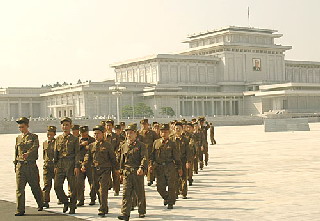 After lining up with hundreds of pilgrims, I glided on a series of escalators
(too fast; at one point, police admonished me to slow down and show respect)
through miles of marble. Plugging in headphones, we could relive the national
agony on the day the Great Leader died, in a variety of languages.
After lining up with hundreds of pilgrims, I glided on a series of escalators
(too fast; at one point, police admonished me to slow down and show respect)
through miles of marble. Plugging in headphones, we could relive the national
agony on the day the Great Leader died, in a variety of languages.
Exaggerated, like everything else in this Silly State. But, all around me, real tears were rolling down the cheeks of locals.
This was something I wish analysts in Washington and Seoul could see. While there is no question that North Korea is to be reviled, a police state that abuses, tortures and tyrannizes its own citizens, there is an awful lot of wishful thinking in security circles about the future direction of this pariah state.
Standard thinking holds that North Korea will either implode or experience the same sort of revolution that swept Eastern Europe. Others feel change can come slowly, mirroring the Chinese reforms allowed by Beijing, at a pace Pyongyang and its people can handle.
Of course, that’s a puzzle for the real world, not the Silver Screen. But rather than ponder such possibilities, it was party time. I was due at the German embassy, where I could at least expect the answer to one nagging riddle. North Korea’s future might be an enormous enigma, but I could find out why Abassador Hertrampf had invited me.
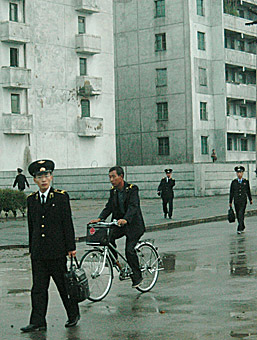 Was it pity at my pathetic imitation of a German tourist who spoke only
English, or her amusement over my obviously false cover as a film buff? Surely
she spotted me as a reporter and was maybe conspiring to free me from my minders
to share inside secrets. Or perhaps, in isolated Pyongyang, she was simply
desperate for company?
Was it pity at my pathetic imitation of a German tourist who spoke only
English, or her amusement over my obviously false cover as a film buff? Surely
she spotted me as a reporter and was maybe conspiring to free me from my minders
to share inside secrets. Or perhaps, in isolated Pyongyang, she was simply
desperate for company?
Alas, I never found out; Hertrampf missed her own party. Bowing to outside pressure, Pyongyang took the unusual step of allowing an international delegation to investigate the blast on its border. Equally unusual, it turned out North Korea wasn’t lying. It turned out to be a mining accident, exactly as the regime had maintained.
While that mystery was unraveled by Hertrampf and other diplomats, I circulated amongst the German film delegation – the largest at the festival – but had to file my invitation with all the other unanswered North Korean conundrums.
Not that it bothered me for too long. The next morning, scores of screening behind me, I was off, back to the world’s most forlorn airport and reality.
Exhausted, I watched the Kim billboards flash past, thinking I’d seen it all. Then, just before the airport, we passed a suburb of drag apartment blocks. Suddenly, the road was filled with scores of men in identical uniform.
At first blurry early-morning glance, I thought it was a cast of clones from some science fiction parody. But they were merely airport workers, commuting to another day on set in North Korea.
Ron Gluckman is an American reporter based in Hong Kong, who roams around the nether reaches of Asia for a variety of publications, including Outside, for which he wrote this story in 2005. It was unpublished until now.
To return to the opening page and index
push here
[right.htm]
